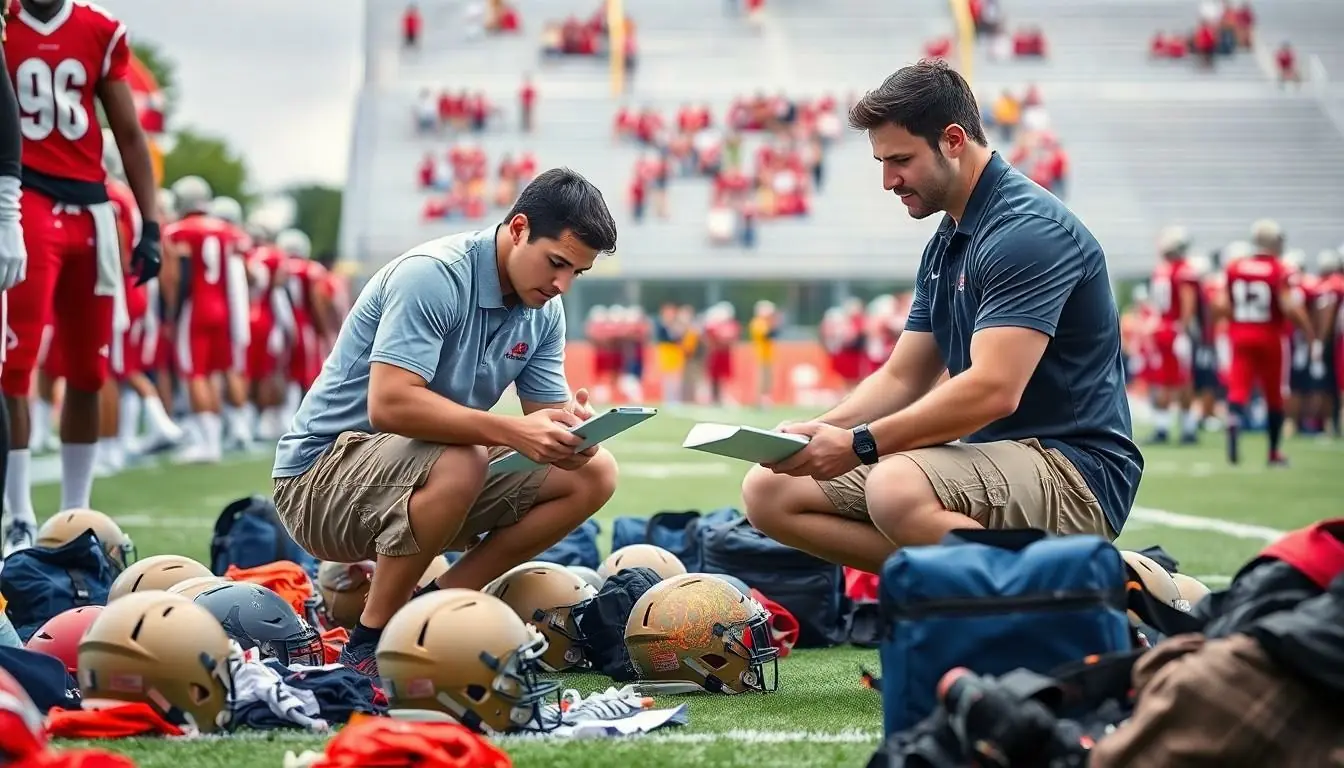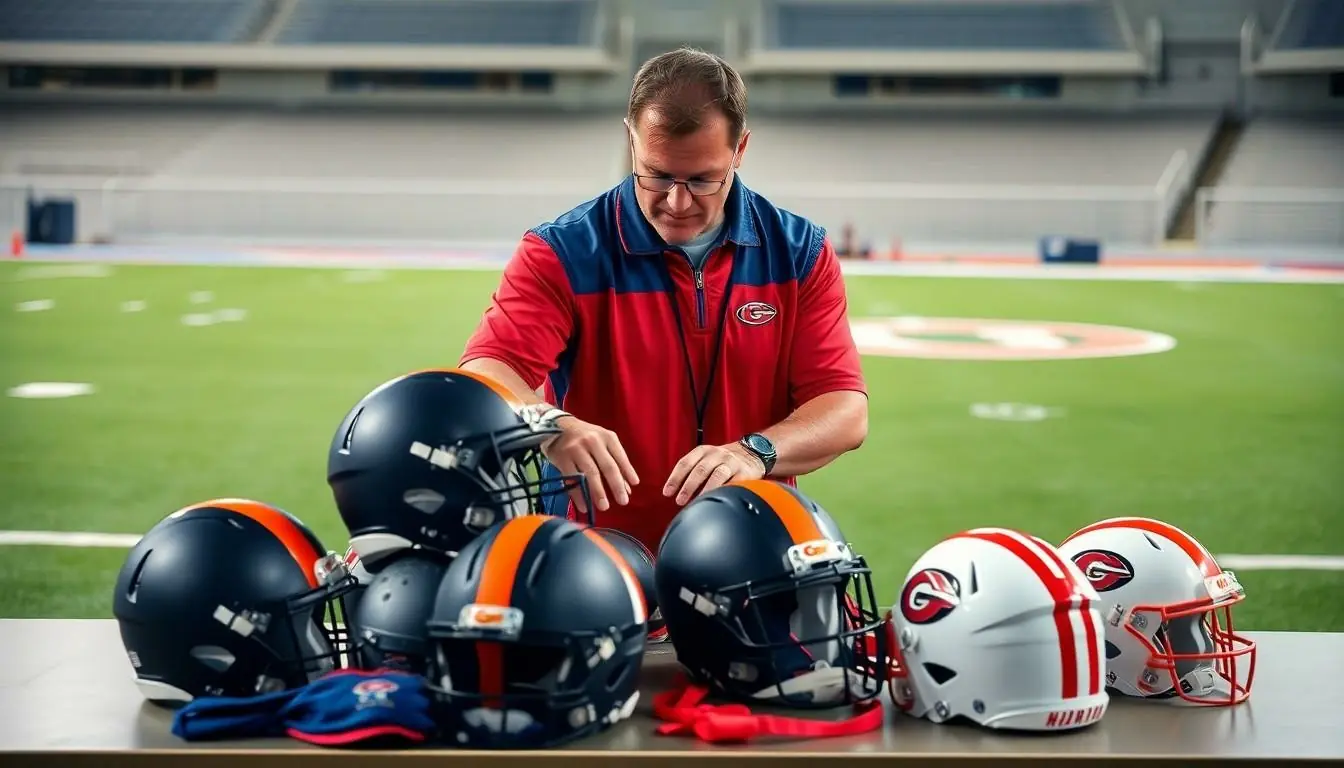In the world of football, while players steal the spotlight, there’s a hidden hero working tirelessly behind the scenes: the equipment manager. This unsung champion ensures that every helmet is polished, every jersey is fresh, and every player is ready to tackle the game. Think of them as the fairy godparents of the football field, transforming chaos into order with a sprinkle of elbow grease and a dash of dedication.
Football equipment manager jobs aren’t just about carrying bags and counting cleats. They’re a blend of strategy, organization, and a touch of magic—like making sure the Gatorade cooler is always full and the sideline is stocked with enough towels to dry a small lake. For those with a passion for the game and a knack for logistics, this role offers a unique opportunity to be part of the action without taking a hit.
Table of Contents
ToggleOverview of Football Equipment Manager Jobs
Football equipment managers play a vital role in team operations, ensuring players are equipped for success on and off the field. Their responsibilities encompass a variety of tasks, including inventory management, equipment repair, and maintenance. Equipment managers handle everything from uniforms to helmets, making sure every piece of gear is in top condition.
In addition, they oversee the logistics of transporting equipment to and from practice sessions and games. Organizing supplies like hydration stations and first aid kits stands as another crucial aspect of their job. Managers also track gear usage and condition, which helps in budgeting for future equipment needs.
Understanding safety regulations is essential for equipment managers, as they ensure compliance with league standards. They often collaborate with coaches, trainers, and players to anticipate needs and address any issues that may arise. Communication remains key; clear exchanges with the coaching staff ensure all equipment aligns with game strategies.
Work hours are often irregular, requiring flexibility as games and practices can occur at varying times. Many equipment managers find their passion for sports translates into a fulfilling career, despite the behind-the-scenes nature of their role. Those with strong organizational skills and a keen attention to detail thrive in this position.
Overall, football equipment manager jobs offer individuals a unique opportunity to contribute to the sport without stepping onto the field.
Key Responsibilities
Football equipment managers play a vital role in maintaining the performance and safety of players. They oversee various tasks that ensure smooth operations during practices and games.
Equipment Management
Equipment managers maintain a detailed inventory of all gear and supplies. They track usage and availability to prevent shortages. Uniforms and helmets require regular inspection for wear and tear; managers conduct these checks frequently. Repairing damaged equipment is essential, as safety hinges on quality gear. Logistics come into play when transporting equipment, ensuring everything arrives on time and is set up correctly. Hydration stations and first aid kits need organization; managers arrange these for easy access during games.
Team Support
Collaboration with coaches and trainers is key for equipment managers. They anticipate player needs and adjust supplies accordingly. Strong communication channels help relay important information and changes. Managers also assist in setting up practice areas and ensuring that all necessary equipment is ready. Support extends beyond logistics; they foster a positive environment by keeping a well-organized and motivating atmosphere. Players benefit from having a dedicated equipment manager who understands both their needs and game strategies.
Required Skills and Qualifications
Football equipment managers require a blend of education and hands-on experience. These roles often necessitate a bachelor’s degree in sports management, kinesiology, or a related field. Experience in athletic settings, such as internships or volunteer positions, adds significant value. Networking within sports communities can enhance career prospects.
Education and Experience
A bachelor’s degree in sports management or kinesiology is commonly expected. Some employers value practical experience just as much as formal education. Many equipment managers gain relevant experience through internships or entry-level positions with athletic teams. Industry certifications, though not mandatory, can provide a competitive edge. In high school sports or at the collegiate level, exposure to team operations contributes to essential skills development.
Technical Skills
Technical skills play a crucial role in an equipment manager’s effectiveness. Knowledge of various equipment types, including uniforms and safety gear, is essential. Proficiency with inventory management software streamlines equipment tracking. Repair skills for uniforms and gear can save time and money, promoting safety on the field. Additionally, familiarity with safety regulations and compliance standards ensures the well-being of all players.
Career Path and Opportunities
Football equipment managers can explore various career paths within the sports industry. Their skills in logistics and player support play a vital role in advancing their careers.
Advancement Opportunities
Progression within the role of equipment manager often leads to higher positions such as head equipment manager or director of equipment operations. Managers may transition into related areas like athletic training, operations management, or sports administration. Networking and gaining experience through internships enhance advancement prospects significantly. Positions with professional teams or large universities frequently offer more opportunities for growth. Active involvement in associations like the Athletic Equipment Managers Association can provide valuable resources for career development.
Salary Expectations
Salaries for football equipment managers can vary widely based on experience, location, and the level of the organization. Entry-level positions may start at approximately $30,000 per year, while experienced managers can earn up to $60,000 or more annually. Teams in major leagues typically offer higher salaries compared to smaller programs. Additionally, benefits such as health insurance and retirement plans often accompany these jobs, enhancing overall compensation. It’s advisable to research specific regions and organizations to get a clearer picture of potential earnings in this field.
Conclusion
Football equipment manager jobs offer a unique blend of passion for the sport and logistical expertise. Those in this role play a vital part in ensuring that players are equipped and ready for success on the field. With responsibilities ranging from equipment maintenance to strategic logistics, equipment managers contribute significantly to team performance and safety.
For individuals seeking a fulfilling career in sports, this position presents an opportunity to engage with the game from a different angle. As the demand for skilled equipment managers grows, aspiring professionals can enhance their prospects through education and hands-on experience. With dedication and the right skills, a rewarding career awaits in the world of football equipment management.





